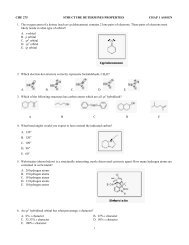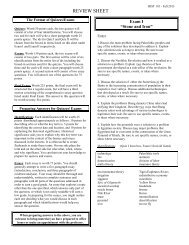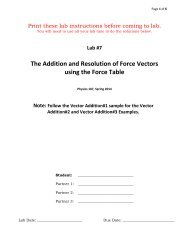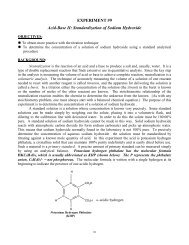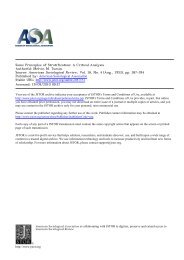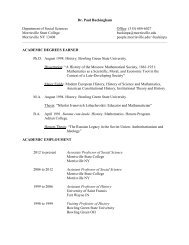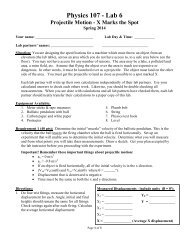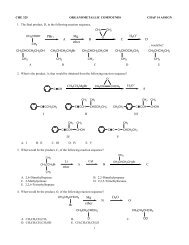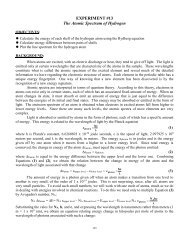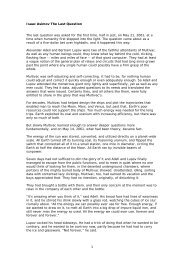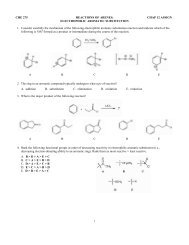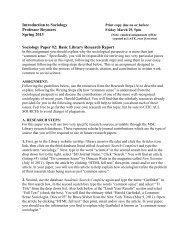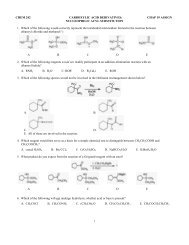Review Sheet- Exam I - Morrisville State College
Review Sheet- Exam I - Morrisville State College
Review Sheet- Exam I - Morrisville State College
Create successful ePaper yourself
Turn your PDF publications into a flip-book with our unique Google optimized e-Paper software.
REVIEW SHEET<br />
HIST 151 - Fall 2013<br />
The Format of Quizzes/<strong>Exam</strong>s<br />
Quizzes: Worth 50 points each, the two quizzes will<br />
consist of a list of four key terms. You will choose two<br />
and for each will write a short paragraph worth 25 points<br />
apiece. The ids for Quiz I and Quiz II will be chosen from<br />
the boxed-in terms listed on this sheet under <strong>Exam</strong> I and<br />
<strong>Exam</strong> II respectively.<br />
<strong>Exam</strong>s: Worth 150 points each, the two exams will<br />
consist of two parts. The first section will be a list of six<br />
key terms from the entire list of ids including the boxedin<br />
section used for the quizzes. You will choose three and<br />
for each will write a short paragraph worth 25 points<br />
apiece. A second section will consist of two essay<br />
questions. You will answer one of the questions for 75<br />
points.<br />
Final <strong>Exam</strong>: Worth 225 points, the final exam will be<br />
structured like a regular exam, but will have a third<br />
section consisting of the comprehensive essay question<br />
listed under Final <strong>Exam</strong>. The answer to this additional<br />
question will be worth another seventy-five points.<br />
Preparing Answers for Quizzes/ <strong>Exam</strong>s<br />
Key terms: Each key term will be worth 25 points<br />
distributed approximately as follows: 10 points for<br />
describing who or what the key term is, 5 points for<br />
identifying the correct date and location, and 10 points for<br />
explaining the historical significance. Historical<br />
significance asks you to explain why this key term was<br />
important in the context of the themes and issues<br />
discussed in the lectures. It is often useful to create<br />
flashcards to study these terms. On one side place the<br />
term and on the other side list who/what, when, where,<br />
and why significant. You can then test your knowledge to<br />
prepare for quizzes and exams.<br />
Essays: Each essay is worth 75 points. You should<br />
generally attempt to write a five-paragraph essay<br />
(introduction, conclusion, and three paragraphs of<br />
evidence/analysis). Your essay should be clearly written<br />
in complete sentences and paragraphs with all parts of the<br />
questions addressed in order to earn a good grade. An<br />
essay that explores a topic other than the one specified,<br />
which answers only part of the question, or which is not<br />
easily readable will earn a low grade. In preparing for the<br />
essays, you might outline each one deciding what you<br />
would discuss in each paragraph and which key terms<br />
would help you answer the question.<br />
When preparing answers to the above, you are<br />
welcome to bring material you have prepared to office<br />
hours or make an appointment with the professor.<br />
<strong>Exam</strong> I<br />
“Creating and Sharing a Surplus Economy”<br />
To 400 B.C.E<br />
Essays<br />
1. Discuss the Neolithic Revolution and its importance in<br />
encouraging more complex human societies. Explain two<br />
theories of how government developed as result. Be sure to<br />
use specific names, events, or ideas where necessary.<br />
2. Discuss the nature of the Tigris-Euphrates river system<br />
and its impact on Ancient Sumeria. Describe two specific<br />
ways the Ancient Sumerians worked together to take<br />
advantage of the agricultural surplus from the rivers. Be<br />
sure to use specific names, events, or ideas where<br />
necessary.<br />
3.Explain how the Nile River made Egyptian civilization<br />
possible. Discuss two specific ways the Nile River shaped<br />
the political and religious institutions of Old Kingdom<br />
Egypt. Be sure to use specific names, events, or ideas<br />
where necessary.<br />
4. Describe three stages in the evolution of democracy in<br />
the Greek city-state of Athens. Explain how each stage<br />
solved some problems, but only served to create an<br />
additional set of problems in Athenian society. Be sure to<br />
use specific names, events, or ideas where necessary.<br />
5. Outline the history of the Peloponnesian Wars. Explain<br />
how its beginning and ending can be explained by the<br />
different ways Sparta and Athens developed and shared<br />
their surplus. Be sure to use specific names, events, or ideas<br />
where necessary.<br />
Key Terms (Quiz I from box, <strong>Exam</strong> I from all listed)<br />
civilization<br />
mafia theory<br />
environmental theory<br />
redistributive economy<br />
Epic of Gilgamesh<br />
Sargon the Great<br />
pharaoh<br />
mummification<br />
archons<br />
Draco<br />
Clisthenes<br />
Delian League<br />
perioikoi/helots<br />
Peloponnesian Wars<br />
Neolithic Revolution<br />
insurance theory<br />
Tigris & Euphrates Rivers<br />
cuneiform<br />
ziggurat<br />
Nile River<br />
maat<br />
pyramid<br />
Council of Areopagus<br />
Solon<br />
Boule/Helia<br />
agoge<br />
Syracuse
<strong>Exam</strong> II<br />
“Great Religious Traditions”<br />
500 B.C.E. to 1000 C.E.<br />
REVIEW SHEET<br />
Final <strong>Exam</strong><br />
“Problems in World History”<br />
500 C.E. to 1600 C.E<br />
HIST 151 - Fall 2013<br />
Essays<br />
1. Describe the role of Hindu beliefs in uniting Indian<br />
societies. Explain how either Buddhism or Jainism<br />
threatened this unity. Discuss how King Ashoka united<br />
the peoples of the Indian subcontinent by using its<br />
religious diversity. Be sure to use specific names,<br />
events, or ideas where necessary.<br />
2. Compare and contrast two of the ancient Chinese<br />
philosophies discussed. Explain how each is based<br />
upon Chinese religious beliefs and how each<br />
philosophy sought to reunite China. Be sure to use<br />
specific names, events, or ideas where necessary.<br />
3. Explain two ways the Persian Empire maintained its<br />
unity. Describe how the empire collapsed and why it<br />
collapsed so quickly. Be sure to use specific names,<br />
events, or ideas where necessary.<br />
4. Discuss how the Roman Empire used religion to hold<br />
its diverse population of conquered peoples together.<br />
Describe how Judaism challenged this and how<br />
Christianity became the unifying force in the Empire.<br />
Be sure to use specific names, events, or ideas where<br />
necessary.<br />
5. Describe two ways Islam united Arabs in the 7th<br />
Century. Explain how political conflicts caused a<br />
schism in Islam shortly after the death of Mohammed.<br />
Be sure to use specific names, events, or ideas where<br />
necessary.<br />
Key Terms (Quiz II from box, <strong>Exam</strong> II all listed)<br />
dharma/karma<br />
Siddhartha Gautama<br />
Ashoka Maurya<br />
Mandate of Heaven<br />
Legalism<br />
Zoroaster<br />
satrapies<br />
Jupiter<br />
Judaism<br />
Constantine<br />
Mohammad<br />
Caliph<br />
Mayan ball game<br />
varnas<br />
Mahavira<br />
ancestral worship<br />
Mo-tsu<br />
Kung Fuzi<br />
“King’s Eyes and Ears”<br />
Alexander the Great<br />
mystery cults<br />
St. Paul<br />
Theodosius<br />
the Five Pillars<br />
Sunni/Shi’a<br />
Mayan calendar<br />
Essays<br />
1. Discuss the nature of feudal political systems. Compare<br />
and contrast solutions developed in Medieval England and<br />
in Tokagawa Japan. to main problem in this system. Be<br />
sure to use specific names, events, or ideas where<br />
necessary.<br />
2. Discuss the role of religion in supporting the legitimacy<br />
of medieval rulers. Explain how this worked and the<br />
challenges in Ethiopia before the 1300. Be sure to use<br />
specific names, events, or ideas where necessary.<br />
3. Explain how Buddhism challenged the legitimacy of the<br />
Emperor in China. Give two examples of how rulers and<br />
philosophers of the Tang and Sung dynasties dealt with this<br />
threat. Be sure to use specific names, events, or ideas where<br />
necessary.<br />
4. Discuss the ways Silk Road trade affected two areas of<br />
the world. Explain the importance of the rise of Genghis<br />
Khan and the Mongols to the history of this trade route. Be<br />
sure to use specific names, events, or ideas where necessary.<br />
5. Compare and contrast the Chinese and European<br />
voyages of discovery including a discussion of what<br />
motivated the two series of explorations and their results.<br />
Be sure to use specific names, events, or ideas where<br />
necessary.<br />
Comprehensive Essay<br />
Humans have developed many ways to cooperate by<br />
building more complex societies. Give three specific<br />
examples from before 1635 demonstrating how a society<br />
successfully or unsuccessfully did this. A strong essay will<br />
draw from the first of this course. Be sure to use specific<br />
names, events, or ideas where necessary.<br />
Key Terms<br />
manorial economy<br />
Eleanor of Aquitaine<br />
Henry III of England<br />
Tokogawa Ieyasu<br />
sankin kotai<br />
King Lalibela<br />
Taoism<br />
The Disposition of Error<br />
Neo-Confucianism<br />
Mansa Musa<br />
Italian Renaissance<br />
Mohammed II Shah<br />
Vasco de Gama<br />
feudalism<br />
Magna Charta<br />
Sei-i-tai Shogun<br />
sakoku rei<br />
han system<br />
Roha<br />
Pure Land Buddhism<br />
Emperor Huichang<br />
the Silk Road<br />
Zanzibar<br />
Genghis Khan<br />
Zheng He<br />
Christopher Columbus



